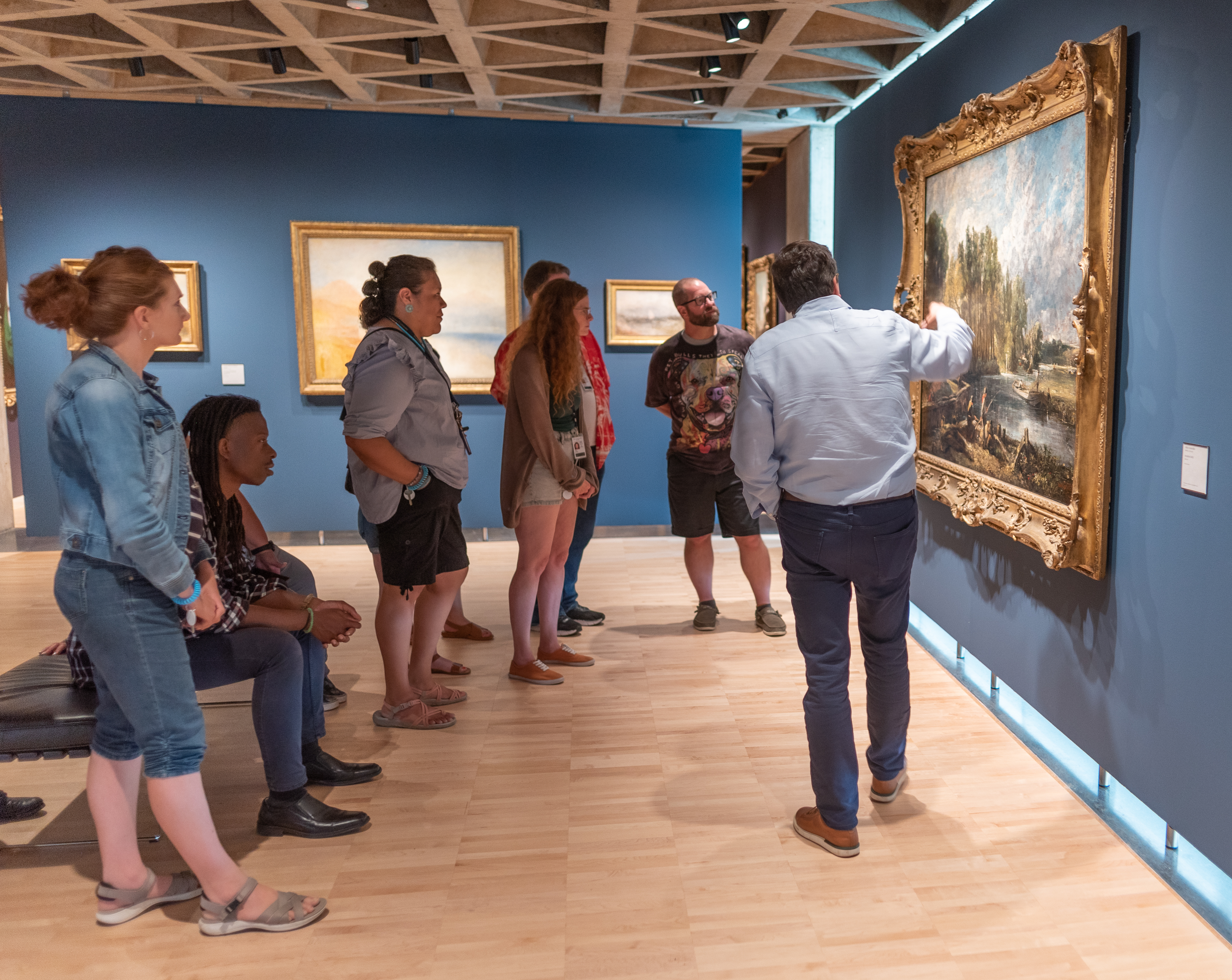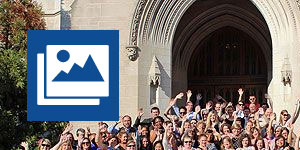- Login
- Home
- About the Initiative
-
Curricular Resources
- Topical Index of Curriculum Units
- View Topical Index of Curriculum Units
- Search Curricular Resources
- View Volumes of Curriculum Units from National Seminars
- Find Curriculum Units Written in Seminars Led by Yale Faculty
- Find Curriculum Units Written by Teachers in National Seminars
- Browse Curriculum Units Developed in Teachers Institutes
- On Common Ground
- Publications
- League of Institutes
- Video Programs
- Contact
Have a suggestion to improve this page?
To leave a general comment about our Web site, please click here
Fifth Annual Conference

This Conference was the twelfth national meeting Yale has held on school-college collaboration that strengthens teaching and learning in the nation's public schools. It was the fifth annual conference of the Yale National Initiative. Following are the remarks Initiative Director James Vivian made in welcoming participants to Yale.
This Conference is the twelfth national meeting Yale has held on school-college collaboration that strengthens teaching and learning in the nation's public schools. Yet, it is particularly timely because of the renewed emphasis that public policy makers and private funders are placing on the fundamental importance of effective teaching to student learning, a precept on which our work is founded.
The first Conference we held in this room twenty-six years ago was the first national meeting of the Chief State School Officers and university presidents from their states. That Conference in 1986 prompted the Education Editor of The New York Times to conclude that a new national movement of collaboration between school teachers and university faculty members had begun to "subvert the traditional separation between school and college." Since then, that collaboration has produced encouraging results. Based on our work in New Haven since 1978 and on the experience of founding new Institutes, we are convinced
- that our approach enhances precisely those dimensions of teacher quality known to improve student learning,
- that Teacher Institutes exemplify the crucial characteristics of the highest quality teacher professional development,
- that Institute participation encourages teachers to remain in their urban schools, and
- that Teachers Institutes animated by the approach we share can be rapidly established in other communities.
These four are among the reasons we undertook the Yale National Initiative as a long-term endeavor to establish Institutes in most states. We want the persuasive example of our Institutes to influence public policy toward teacher professional development. This year and next, in fact, we may have an unrivalled opportunity to make our case before the Administration, Congress, state and local officials, and potential regional and national funders.
The twin purposes of the present Conference are to consider what the cities and counties participating in the Initiative have accomplished so far and to plan for the future of our work locally and nationally. Throughout, we will discuss and learn from each other about the principles and practices of the Teachers Institute approach.
The 2009 National Fellows, whose seminars met on campus in May and July, have returned for the Conference. School district officials, including superintendents, assistant superintendents, chief academic officers and heads of professional development and of curriculum and instruction, have accompanied the Fellows from most communities. College and university administrators from communities now planning or considering an Institute also are participating. Everyone's presence makes this meeting a splendid opportunity to expand and to deepen our work.
Teachers become National Fellows to learn from experience about the Teachers Institute approach and to help their school districts investigate the advantages of that approach for their own curriculum and professional development. National Fellows have had numerous opportunities to meet with their superintendent and other district officials to explain the approach and the promise it holds for their community. The Conference enlarges and intensifies those conversations. Fellows, district officials, and college and university representatives also can learn here from colleagues in other communities. And each city team can take advantage of being in New Haven together to determine the steps you will be taking, when you return home, to develop or sustain a local Teachers Institute.
A hallmark of the Institute approach is the way it combines teachers' further preparation in subjects they teach with the practical application in school classrooms of what they have learned. The curriculum units local and National Fellows write focus the attention of each seminar on increasing the teachers' effectiveness, and thus their districts 'capacity, to improve student learning in the seminar subjects. That is why we begin the Conference this morning with a panel of eleven National Fellows, at least one from each of the seven national seminars we offered this year. They will describe curriculum units they prepared and, in many cases, have begun to teach.
The break-out sessions later this morning address several aspects of the Teachers Institute approach and timely topics in our work. Each session will be led by Institute participants who will open with remarks to frame and stimulate discussion. The topics will be familiar to the National Fellows and to some of the rest of you. Many of you, though, will be hearing about these topics for the first time. Almost two thirds of you who are school district and college or university representatives are attending your first Annual Conference. The Conference affords a valuable opportunity for those of you who know the Institute approach to inform those who are less acquainted with the meaning we invest in teacher leadership, institutional partnership, collegiality, and classroom application; about the methods and results of our evaluations; about the support an Institute provides a school district in carrying out its strategic plans; about the ways we work in the humanities, the sciences, and mathematics; and about petitioning the Administration and Congress to fuel our work.
I urge the team from each community to distribute your members as evenly as possible across the eight break-out sessions this morning so that each session is of a similar, manageable size and so that your team can take part in most, if not all, of these roundtable discussions. Whatever break-out session you attend, you will have an opportunity during lunch to hear reports on the main messages from all of the sessions.
This afternoon a panel, moderated by the founding director of our first new Institute in Philadelphia and composed of representatives from the four communities now planning or beginning to implement a new Teachers Institute, will describe the progress they are making and the strategies they have found to be most productive so that we can congratulate and learn from them. I am delighted to report, as we will hear in some detail, that three communities submitted applications the National Panel recently approved. San Francisco and New Castle County are now beginning the formal Planning Phase, and Charlotte is now beginning Implementation as the newest member of the League of Teachers Institutes. Our work nationally is enriched by their impressive progress locally.
Later this afternoon, the National Fellows will attend seminar reunions. Other delegates will participate in caucuses, one for college and university representatives and another for school district officials, to discuss their respective roles in developing and maintaining a local Teachers Institute, as well as the benefits of an Institute for both school systems and institutions of higher education. The two caucuses will then convene as one to share results and to discuss opportunities they may have to join forces to seek financial support from public and private sources.
The reception and dinner this evening afford our best opportunity for informal conversation across communities and across the roles we play as individuals. Please sign up to select your dinner table. A section in the printed program on the local Institute experience of the National Fellows and college and university faculty attending the Conference, will help you identify individuals with whom you may especially want to talk over dinner or at other times. As with the morning break-out sessions, at dinner we ask that each city team distribute its members across the tables so that, you have a wide acquaintance with colleagues from around the country.
In our first session back here tomorrow morning, Yale faculty members who have led New Haven Institute seminars will describe and answer questions about national seminar possibilities for the coming year. Insofar as we can, we pattern our national work after that of a local Teachers Institute, and we therefore want to present some options to preserve in our national work the principle of organizing seminars that address subjects teachers request for their own further preparation and for the development of curriculum units that will motivate and educate their students.
As Fellows, faculty, and school, college and university representatives from each community, you then will meet as teams to discuss what occurred in the various Conference sessions and the implications of the Conference for your work locally, including the plans you will make for recommending teachers to become National Fellows next year. Each team will select a spokesperson to report at lunch on your meeting.
Again, I welcome you to Yale. The fact that you have taken time from your demanding schedules to participate in this Conference is gratifying, and I hope that you will find the Conference worthwhile.




